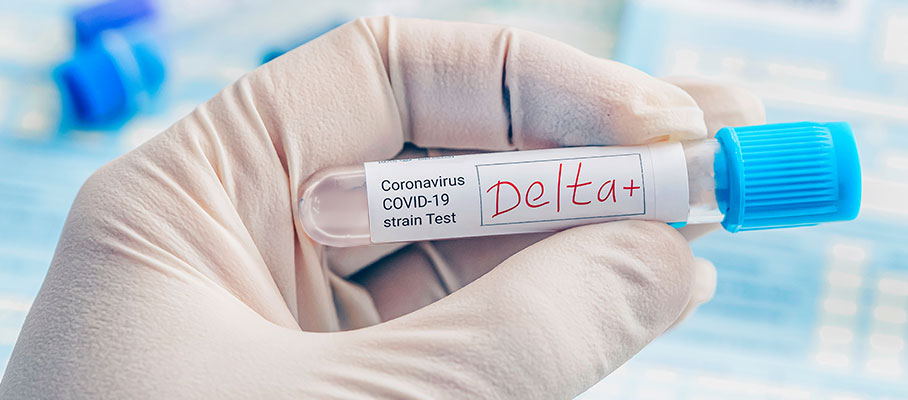Popular Article
Delta Plus and other new COVID Variants: Can they Skip Vaccine Protection

Table of Contents
Viruses continue to change to adapt and survive, and variants emerge when a strain has one or more mutations that induce it to differ from others. Some mutations are insignificant whereas others can make the virus more infectious or virulent. Coronavirus is no different! The recent mutations in the SARS-CoV2 virus has attracted concerns of official bodies. There are several reasons to be worried about, including faster transmission, more severe illness, decreased neutralisation by antibodies and or reduced efficiency of treatment and vaccines.
The pandemic is far from over. Monitor your symptoms and do get an RT-PCR test done if you found yourself facing symptoms suggestive of COVID-19
The Delta variant
In view of the growing COVID-19 pandemic throughout the world, health officials are evaluating certain coronavirus mutations and variants that could be more contagious or deadly than the original strain. According to the Centre for Disease Control and Prevention (CDC), delta variant, which was first identified in India in December 2020, is considered as one of the most infectious variants of the disease. It has been observed that the delta variant is highly contagious, as people infected with this strain can carry up to 1,000 times more virus in their nasal passages than those infected with the original strain.
Cases of delta plus variant infections have been found in 11 countries as yet. Indian experts have also reported mutations that are different from delta in a sublineage of the virus, which is called as “delta plus (AY.1).” This mutation allows the virus to better attack lung cells and potentially escape vaccines. However, more research is required to determine whether the delta plus variant has high transmission rates or involves additional risks. The symptoms of delta variants are similar to those seen with the original coronavirus strain including a persistent cough, headache, fever, and sore throat.
Efficacy of COVID vaccines for delta and delta plus variant
Vaccines including AstraZeneca and Pfizer vaccines remain broadly effective against Delta variants. However, studies also suggest that existing vaccines in India against delta variants are reportedly less effective in individuals with low immune response.
Moreover, the Delta plus variant of coronavirus, due to its mutation of K417N spike protein, may escape vaccines and antibodies more than the Delta variant. On the contrary, second dose of vaccination has been shown to produce enough antibodies against COVID-19 infection, suggestive of its efficiency.
This has been verified by another small research study at the Indian Council of Medical Research and Bharat Biotech International, who co-developed the Covaxin COVID-19 vaccine and reported its effectiveness against the delta variant. The authors found that antibodies from vaccinated individuals were not as effective at neutralizing the virus variant in a lab study.
Covaxin is made from the entire SARS-CoV-2 virus, which is chemically altered to prevent it from replicating. When a vaccine is administered to an individual, they can make antibodies to many different parts of the virus. If one part mutates to give rise to a new variant, like the delta variant, then antibodies to other parts of the virus should still provide enough protection.
Is one shot of vaccine sufficient for delta variants?
Reports suggest that a person who has received just a single shot of a two-dose vaccine may not have any protection against the delta variant.
This study highlights the importance of finishing the recommended vaccine dosage. According to an analysis, two doses of the Pfizer-BioNTech vaccine is about 88 percent effective against symptomatic disease and 96 percent effective against hospitalization with the delta variant.
Effects of Delta variant on unvaccinated individuals
Individuals who are not fully vaccinated against COVID-19 are at maximum risk of infection with this variant. Kids and younger adults who are not vaccinated may be susceptible to COVID-19 as well.
Effects of Delta variant on vaccinated individuals
In initial studies, two doses of the Pfizer vaccine are about 88% effective against disease and 96% effective against hospitalization with the Delta variant. The AstraZeneca vaccine was about 60% effective against disease and 93% effective against hospitalization.
Now vaccine makers are investigating booster shots to check if they can provide better protection against the Delta variant and other variants.
Book a quantitative COVID antibody test and check how many antibodies you developed after completing your COVID jabs.
Takeaway
The Indian government currently is not planning to introduce any change in its vaccination policy due to the Delta Plus variant. However, Indian Council of Medical Research (ICMR) and the National Institute of Virology (NIV) are about to launch a study to assess the efficiency of the COVID19 vaccines in India, Covishield and Covaxin, against the Delta Plus variant.
Although the current vaccinations may offer less protection against milder, symptomatic illness caused by delta variants, it is still important that people get fully vaccinated as it is the only significant protection against these variants.























